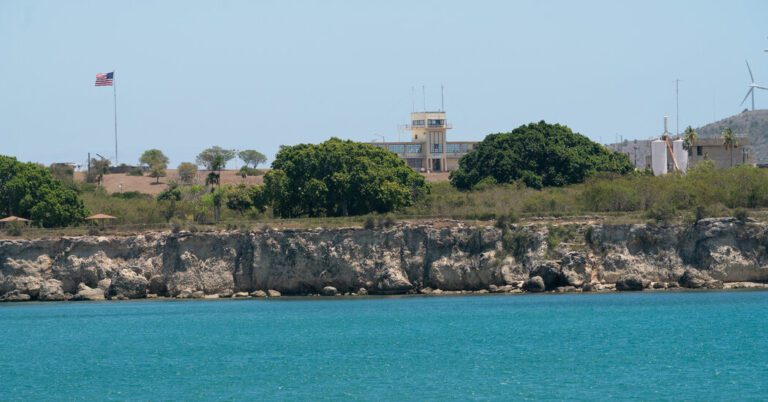
[ad_1]
Times Insider explains who we are and what we do and delivers behind-the-scenes insights into how our journalism comes together.
It was a sunny day in May 2015 when Sarah Koenig and Dana Chivvis stepped off a U.S. military-chartered plane and onto the naval base at Guantánamo Bay, Cuba.
They were there to learn the unofficial story of Guantánamo, where, after Sept. 11, the U.S. government had opened a prison to hold people it suspected of being members of the Taliban or Al Qaeda.
So began a story that would span nearly 10 years and hundreds of hours of interviews.
That story is told in the new season of “Serial,” a podcast from Serial Productions and The New York Times. Over nine episodes (the first two drop on Thursday), Ms. Koenig and Ms. Chivvis, the season’s co-hosts, present a mosaic of life at Guantánamo using the experiences of those who have survived and served there, as Ms. Koenig put it in the season’s trailer. That includes former prisoners, guards, interrogators and more.
“There’s been a tremendous amount of amazing and important reporting on the place in the realm of geopolitics and policymaking,” Ms. Chivvis said. “But what we were trying to do was recreate the world of Guantánamo through the personal stories of people who have existed and lived and worked and been imprisoned there.”
Between Ms. Koenig and Ms. Chivvis’s first visit to Guantánamo in 2015 and Thursday’s season premiere, there were a few false starts, and interviews with more than 100 people. When Ms. Koenig and Ms. Chivvis first visited, they found that many sources were hesitant to speak on the record. Some personnel didn’t want to risk their careers. Former detainees they reached out to were nervous about unpacking their experiences, or just wanted to move on.
“People would tell us really interesting and crazy things off the record,” Ms. Chivvis said. “But as soon as we turned our microphones on and stuck them in their faces, they totally clammed up.”
Their editor Julie Snyder had the idea of putting together a pilot for a TV show about a fictionalized version of Guantánamo. She thought people might be more candid if they were contributing on background, not as named sources.
“That was when crazy, debauched stories started coming up,” Ms. Koenig said.
By 2020, they had completed a script for a pilot that attracted interest from a production company. But by then, Ms. Koenig thought enough people might have returned to civilian life and agree to share those stories on the record.
“I figured it was worth a shot,” she said.
Her hunch proved correct: With a few more years’ distance from their deployment or detainment, former guards and prisoners were willing to speak candidly. So Ms. Chivvis and Ms. Koenig re-interviewed people on the record. The pair also returned to Guantánamo in 2022. This time, they were able to observe and report on court proceedings. They also conducted more interviews.
Over the course of their reporting, Ms. Chivvis and Ms. Koenig compiled hundreds of hours of interviews spanning nearly a decade, which they needed to shape into a story.
“We have this incredible, vast array of stories and people who will talk to us at the end of the day,” Ms. Koenig said. “So then it was just deciding which ones to focus on and why.”
Over the past year, the team combed through the recordings and decided to devote the season to individual people’s stories, presenting listeners with a rich range of perspectives and personalities.
“What’s cool about the podcast is that you hear both sides,” Ms. Chivvis said. “You hear from detainees about what it’s like to survive day to day as a prisoner and then you hear from a bunch of American service members who worked there about what life was like on the other side of the wall.” (The town, she said, was surprisingly lively and had a robust party scene, with guards blowing off steam after their shifts at area bars. In the season’s trailer, someone even called it “la la land.”)
The series also examines the question of why, 15 years after President Obama signed an executive order to close the prison, it remains open with 30 detainees. President Biden renewed the initiative to close the prison in 2021, but progress has been slow going.
“I think most people don’t think about Guantánamo,” Ms. Chivvis said. “It’s one of those things that you relegate to a page in the history book in your mind.” But because Guantánamo is still open, she added, “it’s not actually history yet.”
The hope, Ms. Koenig said, is that people will come away from the podcast with renewed interest in Guantánamo, a place they might not have thought about in years.
“We want to bring them into a very complicated topic in this way that’s intimate and compelling” she said. “I think — I hope — that people will understand Guantánamo in a way they haven’t.”
[ad_2]